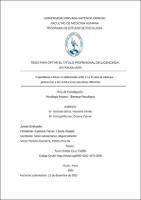Expectativas a futuro en adolescentes entre 11 a 15 años de edad que pertenezcan a dos instituciones educativas diferentes

Date
2024Author(s)
Gonzáles Benza, Giovanna Cecilia
Portugal Román, Cristina Yasmín
Metadata
Show full item recordAbstract
En la presente indagación se planteó conocer si hay diferencia de significancia
relevante en las expectativas del futuro. El tipo de investigación fue sustantivo, y el diseño
se basó en una descripción con una correlación. Se ejecutó la investigación en 230
estudiantes entre varones y mujeres mayores de 10 años y menores 16, siendo 115
pertenecientes a la institución privada y 115 a la una institución nacional, a quienes se les
aplicó una “Escala de expectativas futuras en el adolescente” (EEFA), siendo sus autores
Sánchez – Sandoval y Verdugo (2016), y que además dicho instrumento pasó por una
adaptación a la realidad del Perú por Correa (2018). Dicho estudio permitió comprender
que existe diferencia altamente significativa p=.000 donde la I.E. Privada alcanzó mayor
rango promedio (170,38) que la I.E. Nacional (60,62). La investigación permitió concluir
que el proyecto es vital y significativo, en vista de que nuestros resultados arrojaron que
la institución educativa privada, a través de sus mayores recursos y enfoques educativos
más personalizados, proyectan expectativas más altas para el desarrollo integral de los
estudiantes en comparación con la I.E nacional. Este hallazgo resalta la importancia del
entorno educativo en la formación personal, subrayando cómo la calidad y enfoque del
colegio pueden influir en el desarrollo individual de los alumnos In the present inquiry, the aim was to know if there is a significant difference in
future expectations. The type of research was substantive, and the design was based on a
description with a correlation. The research was carried out on 230 students, between
males and females over 10 years of age and under 16 years of age, 115 belonging to the
private institution and 115 to the national institution, to whom a ““Scale of Future
Expectations in the Adolescent““ (EEFA) was applied, being its authors Verdugo and
Sánchez-Sandoval (2016), and that this instrument also went through an adaptation to the
reality of Peru by Correa (2018). This study allowed us to understand that there is a highly
significant difference p=.000 where the Private EI reached a higher average range
(170.38) than the National EI (60.62). The research allowed us to conclude that the project
is vital and significant, given that our results showed that the private educational
institution, through its greater resources and more personalized educational approaches,
project higher expectations for the comprehensive development of students compared to
with the national I.E. This finding highlights the importance of the educational
environment in personal development, underlining how the quality and approach of the
school can influence the individual development of students
Collections
- Psicología [543]

